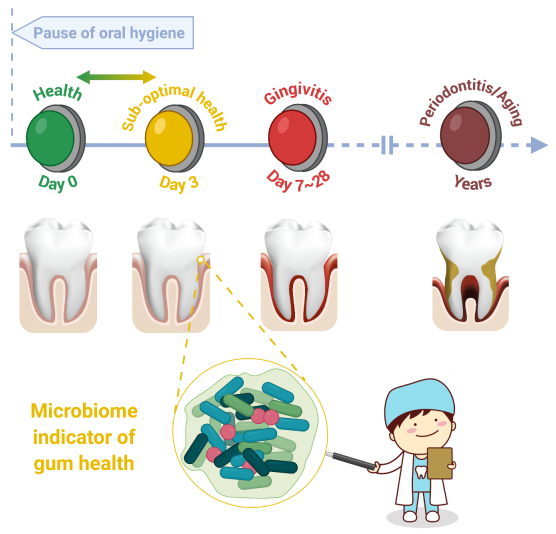
Newsroom
Poor oral hygiene produces gum-disease bacteria and accelerates oral microbiome aging faster than previously thought.
A new study shows that within 24-72 hours of the interruption of oral hygiene, there was a steep decrease in the presence of 'good oral bacteria' and the beneficial anti-inflammatory chemicals they are associated with. An increase of 'bad bacteria' typically present in the mouths of patients with periodontitis, a severe gum disease which can lead to tooth damage or loss, was also discovered.
The research team, led by scientists from Single-Cell Center, Qingdao Institute of BioEnergy and Bioprocess Technology (QIBEBT) of the Chinese Academy of Sciences (CAS) and Procter & Gamble Company (P&G), published their findings in the journal mBio on Mar. 9, 2021.
The researchers asked 40 study participants with different levels of naturally occurring gingivitis to perform optimal oral hygiene for three weeks. This led to reduced gingivitis and a healthy baseline for the study. Gingivitis was then induced when their oral hygiene routine was interrupted over the course of four weeks. Restart of oral hygiene leads to recovery due to the reversible nature of gingivitis.
The researchers performed genetic analyses on the population of bacteria in the participants' gum as it changed. Chemical analyses of the molecules produced by the bacteria were performed and immune responses of the study participants were recorded.
Within just 24-72 hours of the cessation of oral hygiene, the researchers found there was a steep decrease in the presence of multiple Rothia species as well as the chemical betaine, which was reported to play an anti-inflammatory role in several inflammatory diseases.
In addition, there was a swift, full activation of multiple salivary cytokines - proteins and other molecules produced by immune system cells associated with inflammation. And just as the presence of the 'good bacteria' had declined, there was a sharp increase in the presence of the types of bacteria typically present in the mouths of patients with periodontitis even though there weren’t any symptoms of the illness yet.
Taken together, the positive association with betaine and the negative association with gingivitis suggest that Rothia may be 'good bacteria' beneficial to gum health, contributing to the production of betaine in some way.
"We also found a sudden 'aging' of the bacteria in the mouth," said XU Jian, Director of Single-Cell Center at QIBEBT and senior author of the study. "Their oral microbiome had aged the equivalent of about a year in less than a month."
Previous studies have demonstrated that the composition of the population of oral bacteria (the oral microbiome) is a good predictor of the age of a patient. As one ages, one sees less of some species of bacteria and more of others. Older people, for example, tend to have far fewer Rothia species of bacteria.
"After only 28 days of gingivitis, we found the study participants had the 'oral microbial age' of those a year older," said HUANG Shi, one investigator leading this study.
The researchers now want to continue to study the link between Rothia, betaine and inflammation to see if they can come up with better early-stage responses to gingivitis.

Longitudinal multi-omics and microbiome meta-analysis identify an asymptomatic gingival state that links gingivitis, periodontitis and aging. (Image by LIU Yang)
